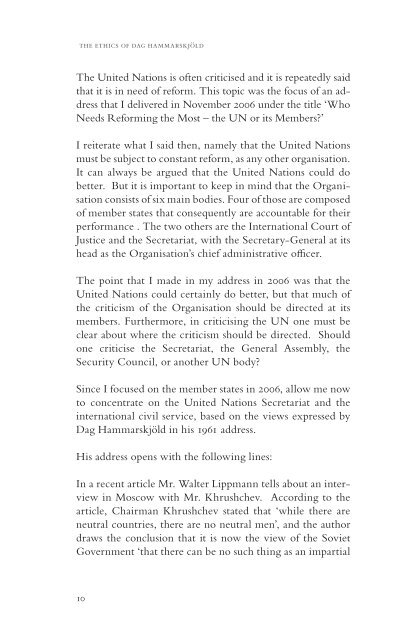Download as pdf - Dag Hammarskjöld Foundation
Download as pdf - Dag Hammarskjöld Foundation
Download as pdf - Dag Hammarskjöld Foundation
Create successful ePaper yourself
Turn your PDF publications into a flip-book with our unique Google optimized e-Paper software.
the ethics of dag hammarskjöld<br />
The United Nations is often criticised and it is repeatedly said<br />
that it is in need of reform. This topic w<strong>as</strong> the focus of an address<br />
that I delivered in November 2006 under the title ‘Who<br />
Needs Reforming the Most – the UN or its Members?’<br />
I reiterate what I said then, namely that the United Nations<br />
must be subject to constant reform, <strong>as</strong> any other organisation.<br />
It can always be argued that the United Nations could do<br />
better. But it is important to keep in mind that the Organisation<br />
consists of six main bodies. Four of those are composed<br />
of member states that consequently are accountable for their<br />
performance . The two others are the International Court of<br />
Justice and the Secretariat, with the Secretary-General at its<br />
head <strong>as</strong> the Organisation’s chief administrative officer.<br />
The point that I made in my address in 2006 w<strong>as</strong> that the<br />
United Nations could certainly do better, but that much of<br />
the criticism of the Organisation should be directed at its<br />
members. Furthermore, in criticising the UN one must be<br />
clear about where the criticism should be directed. Should<br />
one criticise the Secretariat, the General Assembly, the<br />
Security Council, or another UN body?<br />
Since I focused on the member states in 2006, allow me now<br />
to concentrate on the United Nations Secretariat and the<br />
international civil service, b<strong>as</strong>ed on the views expressed by<br />
<strong>Dag</strong> <strong>Hammarskjöld</strong> in his 1961 address.<br />
His address opens with the following lines:<br />
In a recent article Mr. Walter Lippmann tells about an interview<br />
in Moscow with Mr. Khrushchev. According to the<br />
article, Chairman Khrushchev stated that ‘while there are<br />
neutral countries, there are no neutral men’, and the author<br />
draws the conclusion that it is now the view of the Soviet<br />
Government ‘that there can be no such thing <strong>as</strong> an impartial<br />
10
















